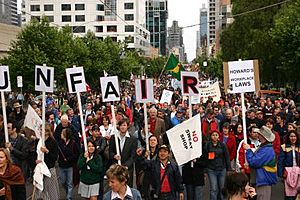Industrial relations facts for kids
Industrial relations (also called labor relations) is a field that studies the connections between employers (management) and their workers. It often focuses on groups of workers who are part of a union. This field looks at how these groups work together, solve problems, and make decisions about jobs and workplaces.
Contents
What is Industrial Relations?
Industrial relations is all about understanding the rules and relationships in the workplace. It's like a special area of study that looks at how bosses and employees get along. This includes how they talk to each other, how they agree on things like pay and working hours, and how they sort out disagreements. It's important because it helps make sure workplaces are fair and productive for everyone.
Who is Involved?
Many different groups play a part in industrial relations. Each group has its own goals and ways of working.
Workers and Unions
Workers are the people who do the jobs. Sometimes, workers join a group called a union. A union is like a team that speaks up for its members. Unions help workers get fair pay, good working conditions, and safe workplaces. They can also help if a worker has a problem with their boss.
Employers and Management
Employers are the people or companies that hire workers. Management refers to the people who run the company and make decisions. Employers want their businesses to do well and be profitable. They also need to make sure their employees are happy and productive. Industrial relations helps employers and workers find ways to meet both these goals.
The Government's Role
Governments also play a role in industrial relations. They create laws and rules that affect workplaces. These laws cover things like minimum wage, safety standards, and how unions can operate. The government tries to make sure that both workers and employers are treated fairly and that the economy runs smoothly.
Why is Industrial Relations Important?
Industrial relations is very important because it affects everyone. It helps create a balance between what workers need and what businesses need. When industrial relations work well, it can lead to:
- Fair wages and benefits for workers.
- Safe and healthy workplaces.
- Fewer arguments and strikes.
- Better productivity for businesses.
- A stronger economy for the country.
It helps prevent big problems and makes sure that people can work together peacefully.
How Does it Work?
Industrial relations involves different ways for workers and employers to communicate and solve issues.
Talking Things Over (Negotiation)
One main part of industrial relations is negotiation. This is when workers (often through their union) and employers talk about things like pay, working hours, and benefits. They try to reach an agreement that works for everyone. This agreement is often written down in a contract.
Solving Problems (Dispute Resolution)
Sometimes, workers and employers might disagree. When this happens, industrial relations provides ways to solve these problems. This can include:
- Mediation: A neutral person helps both sides talk and find a solution.
- Arbitration: A neutral person listens to both sides and then makes a decision that both sides must follow.
- Strikes or Lockouts: If agreements can't be reached, workers might go on strike (stop working), or employers might do a lockout (prevent workers from coming to work). These are usually last resorts.
Images for kids
 | Lonnie Johnson |
 | Granville Woods |
 | Lewis Howard Latimer |
 | James West |



